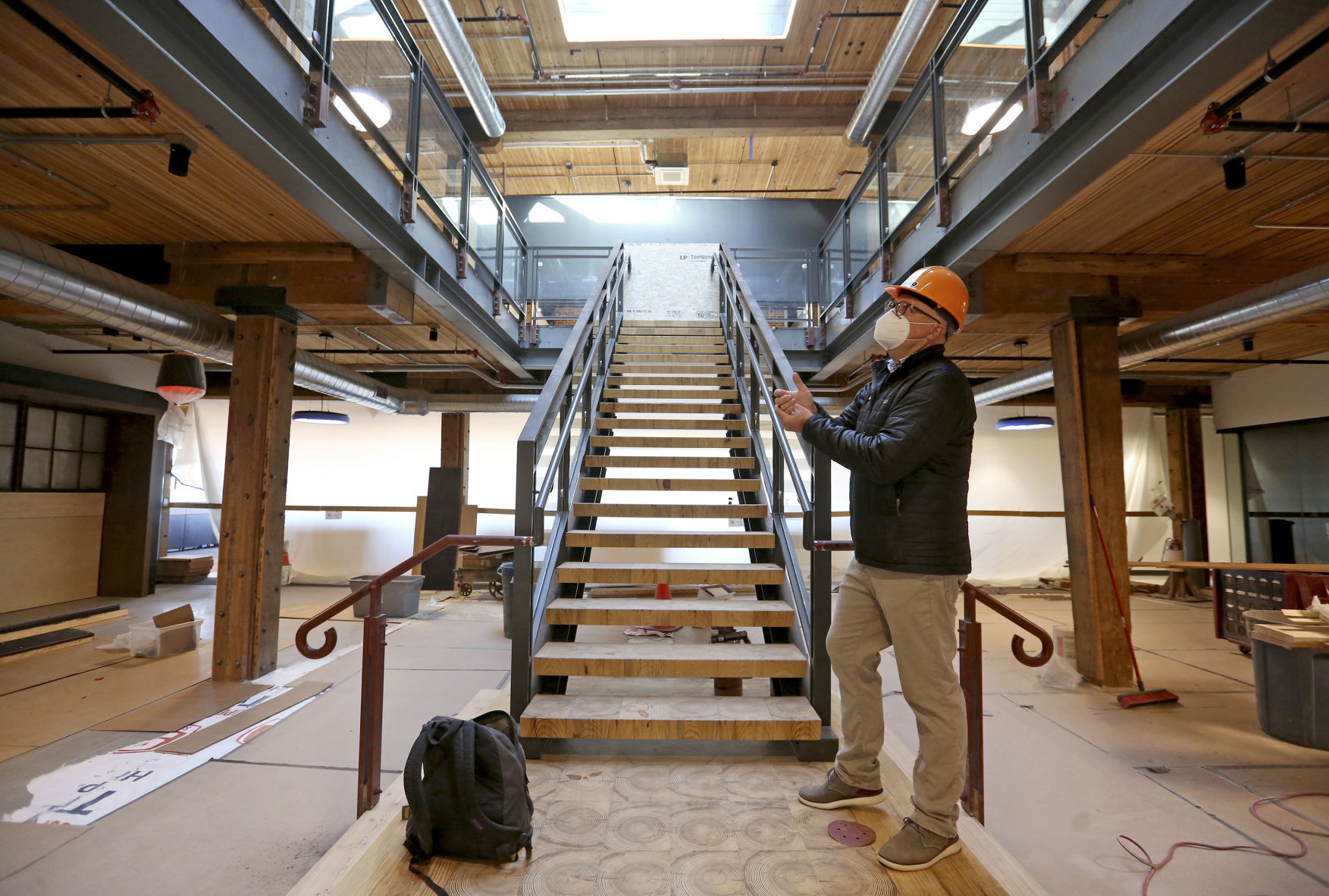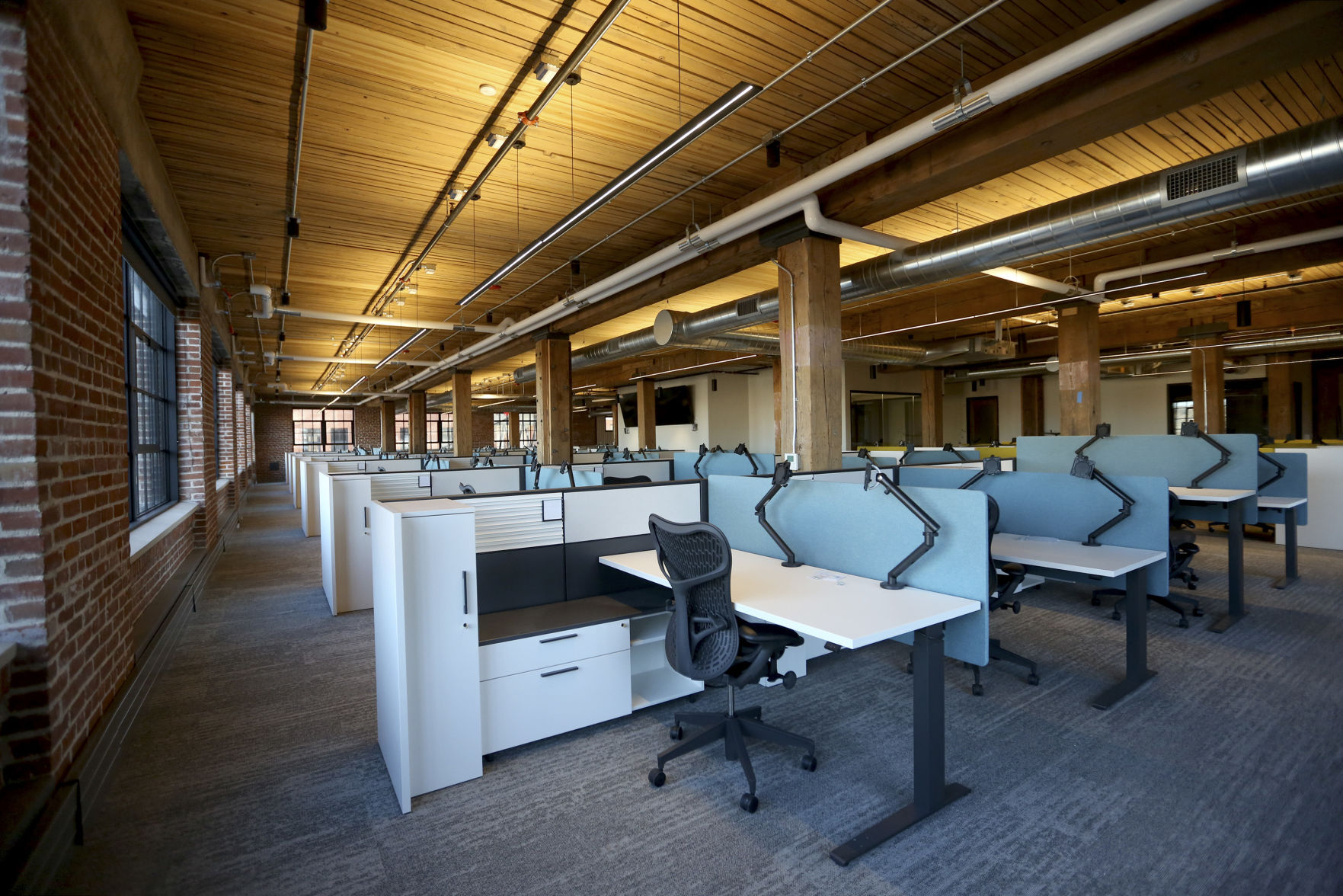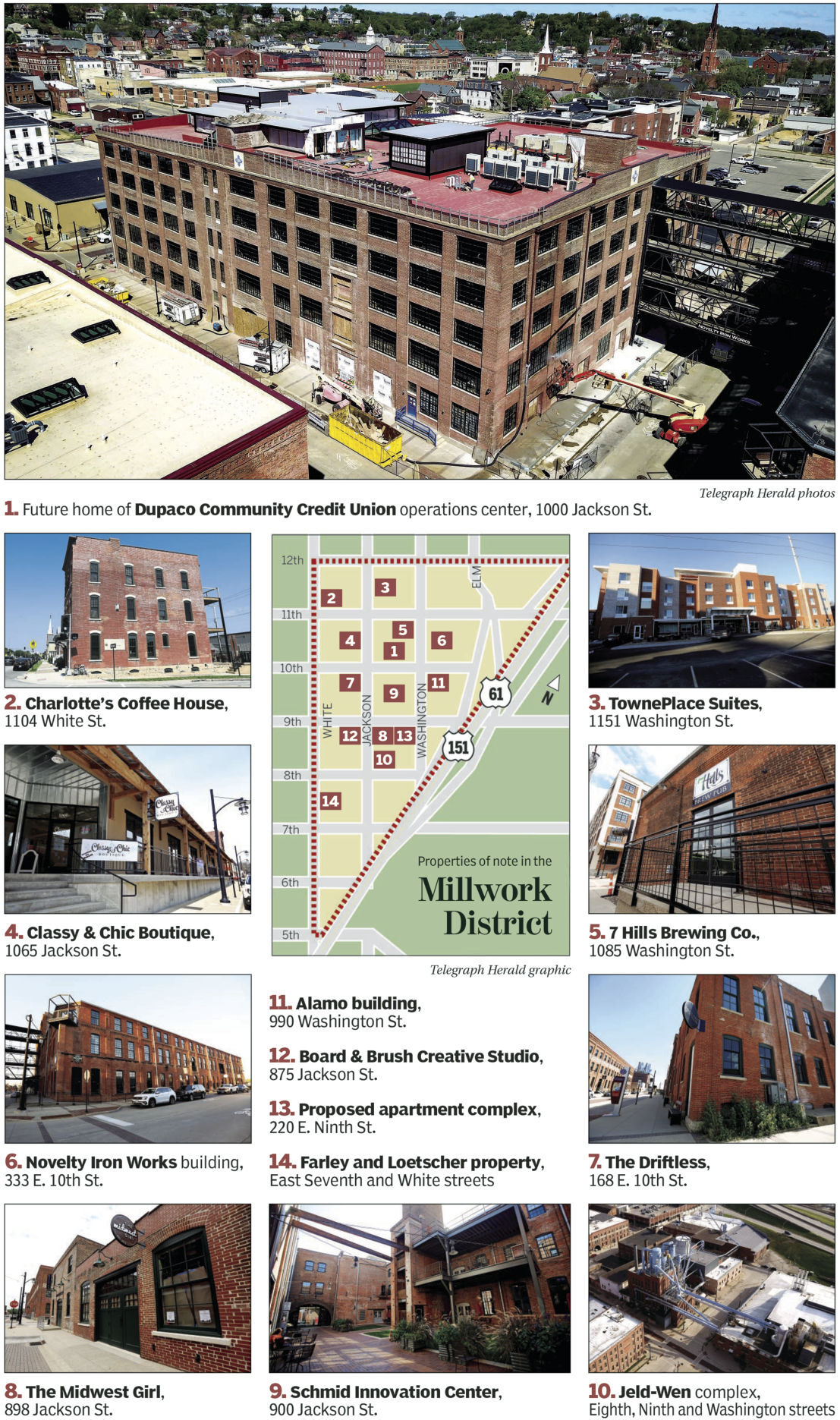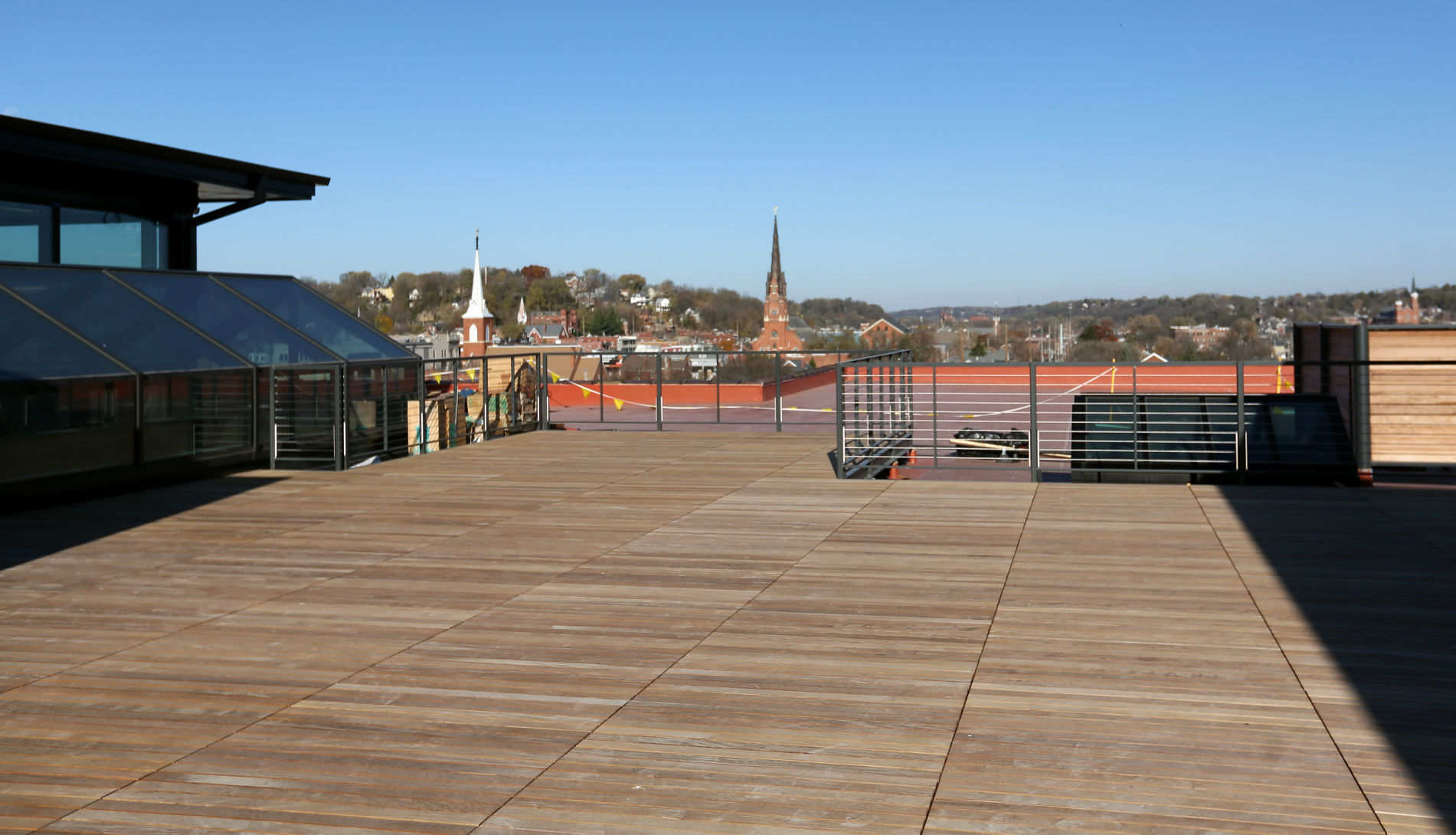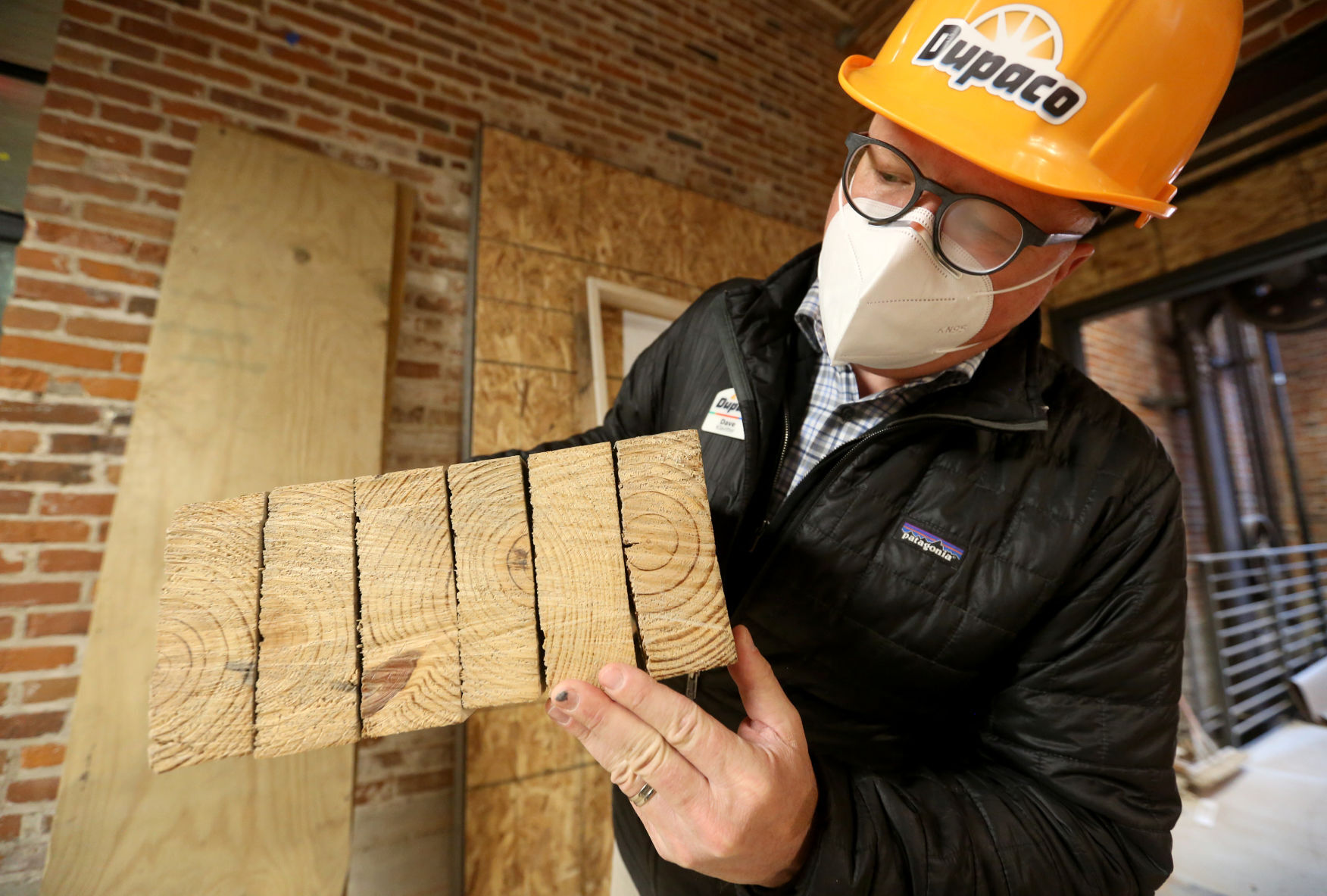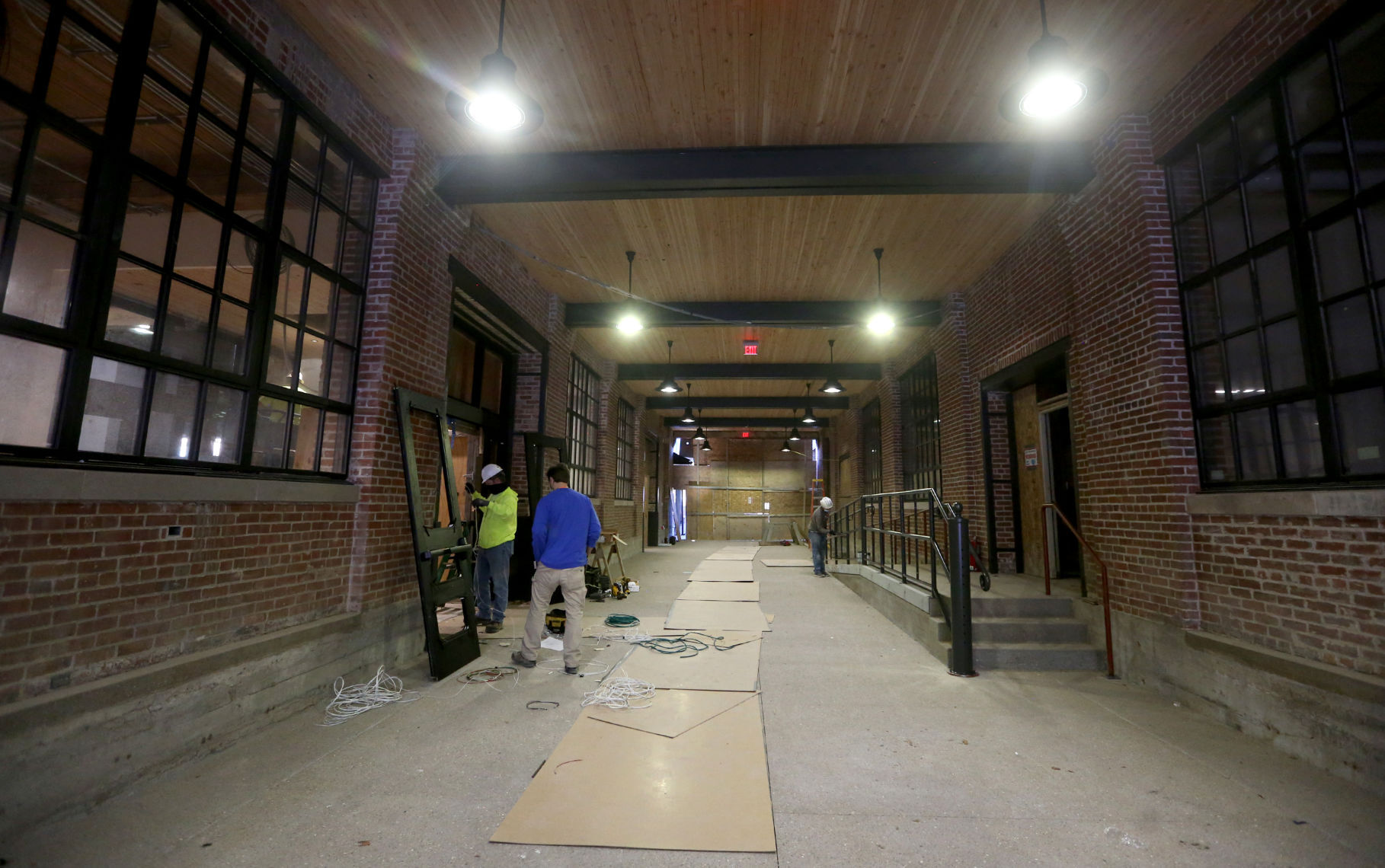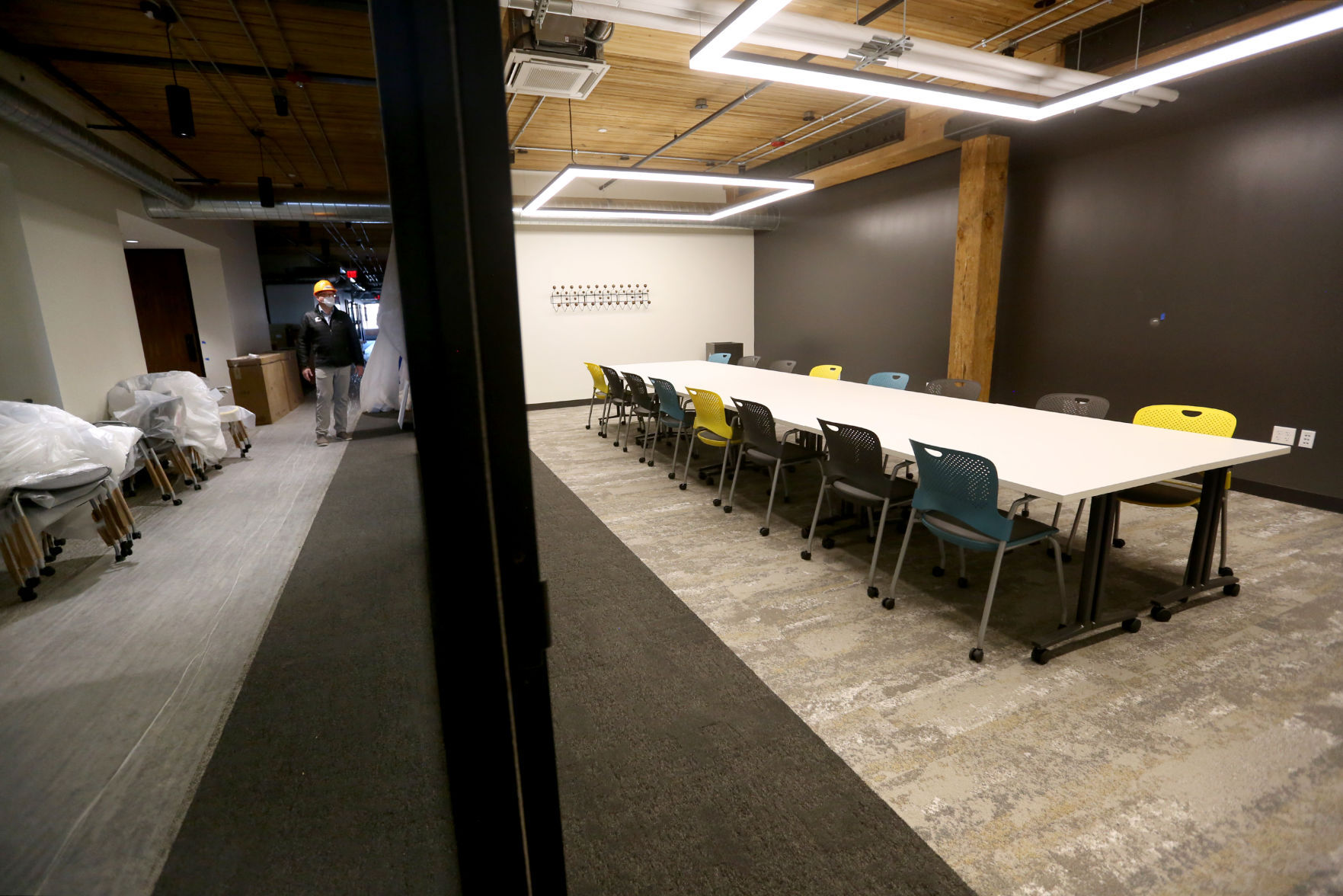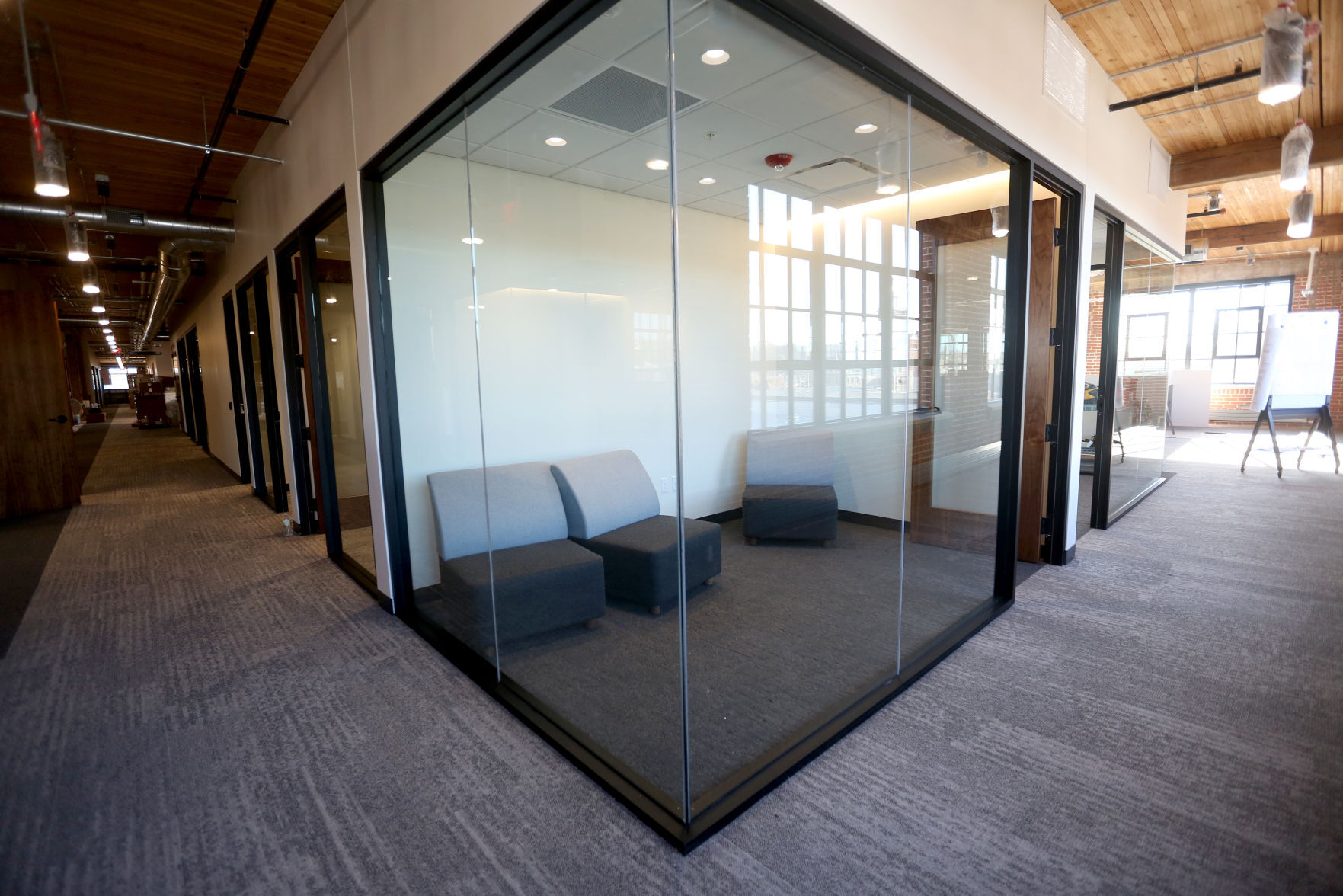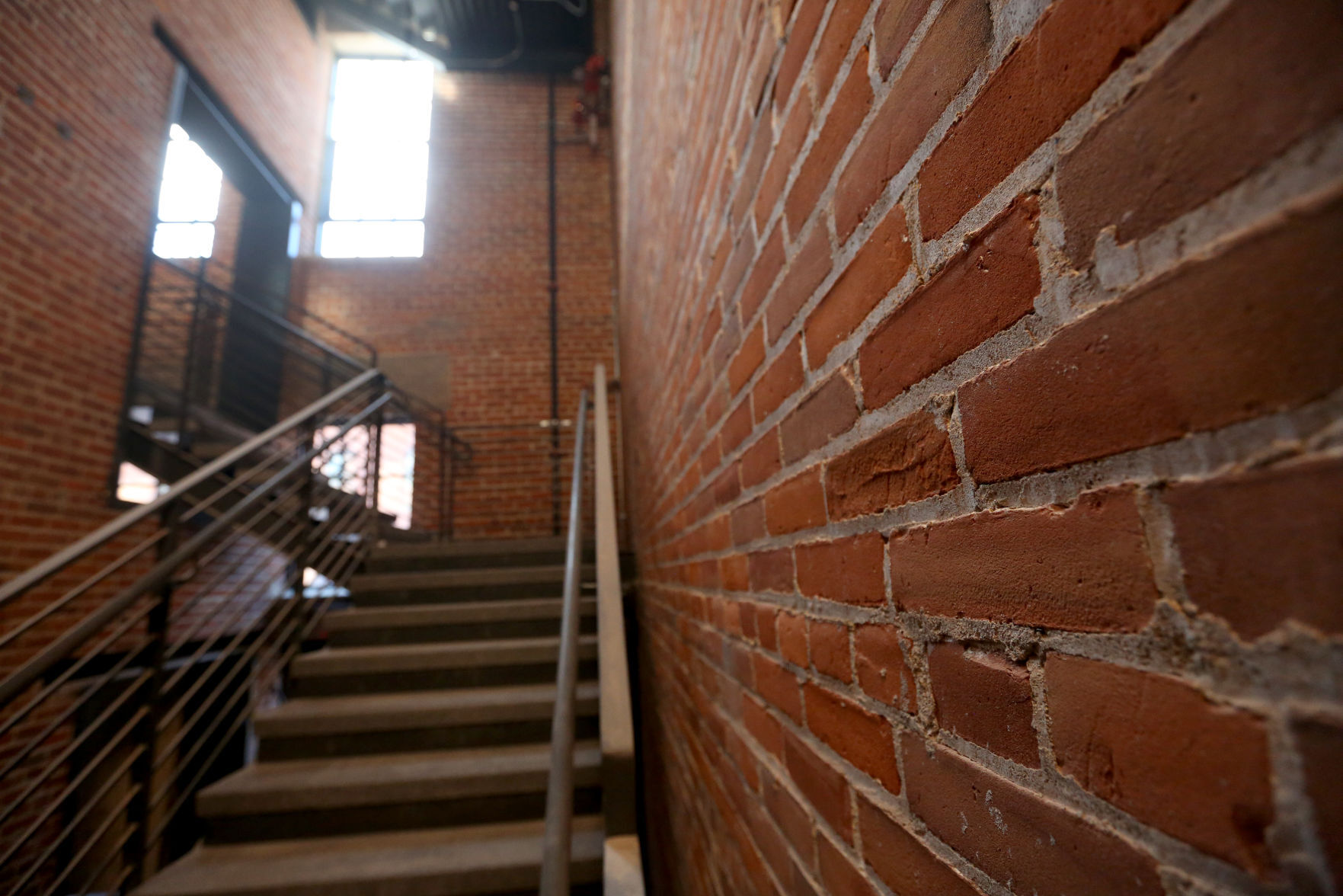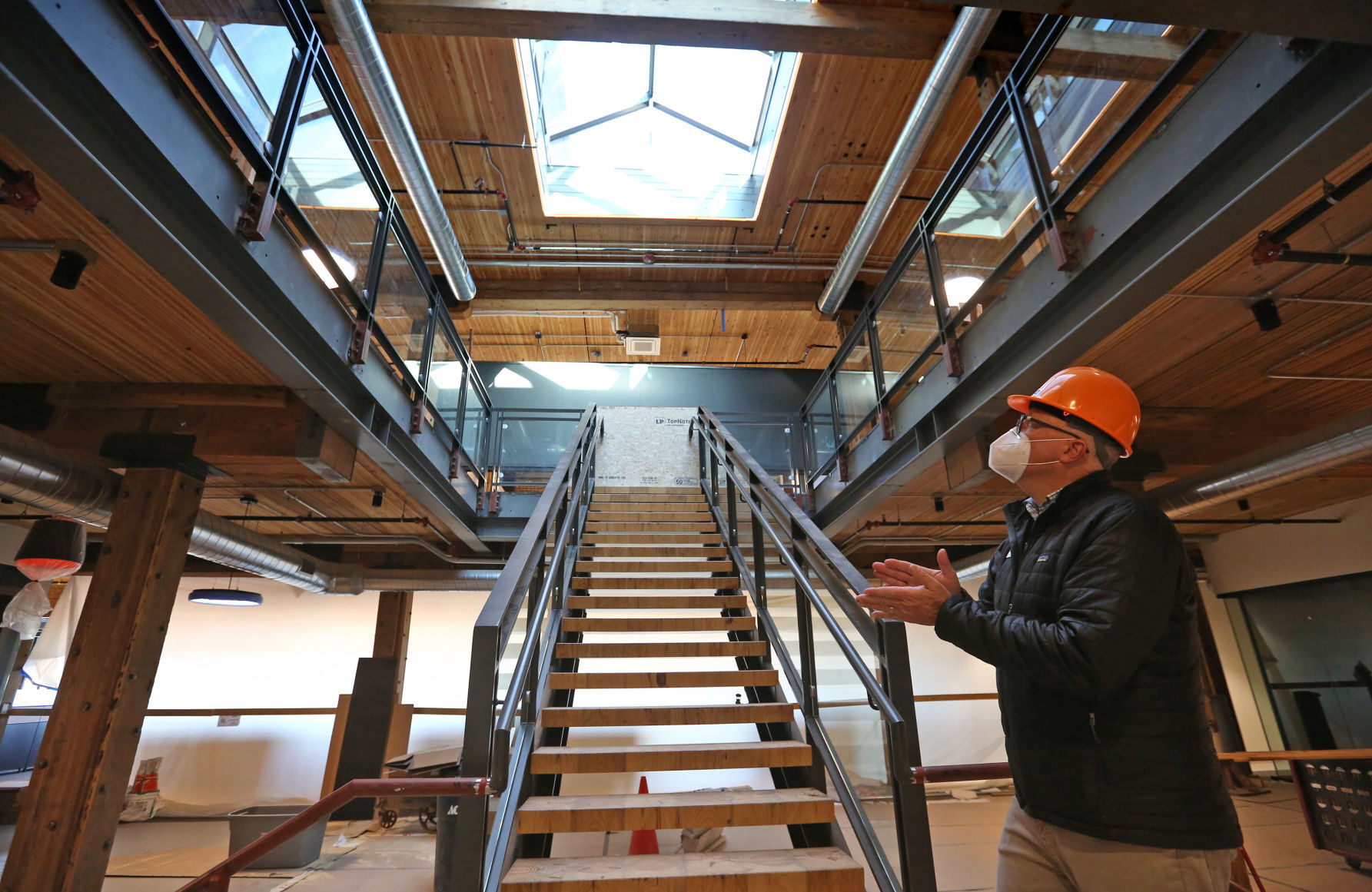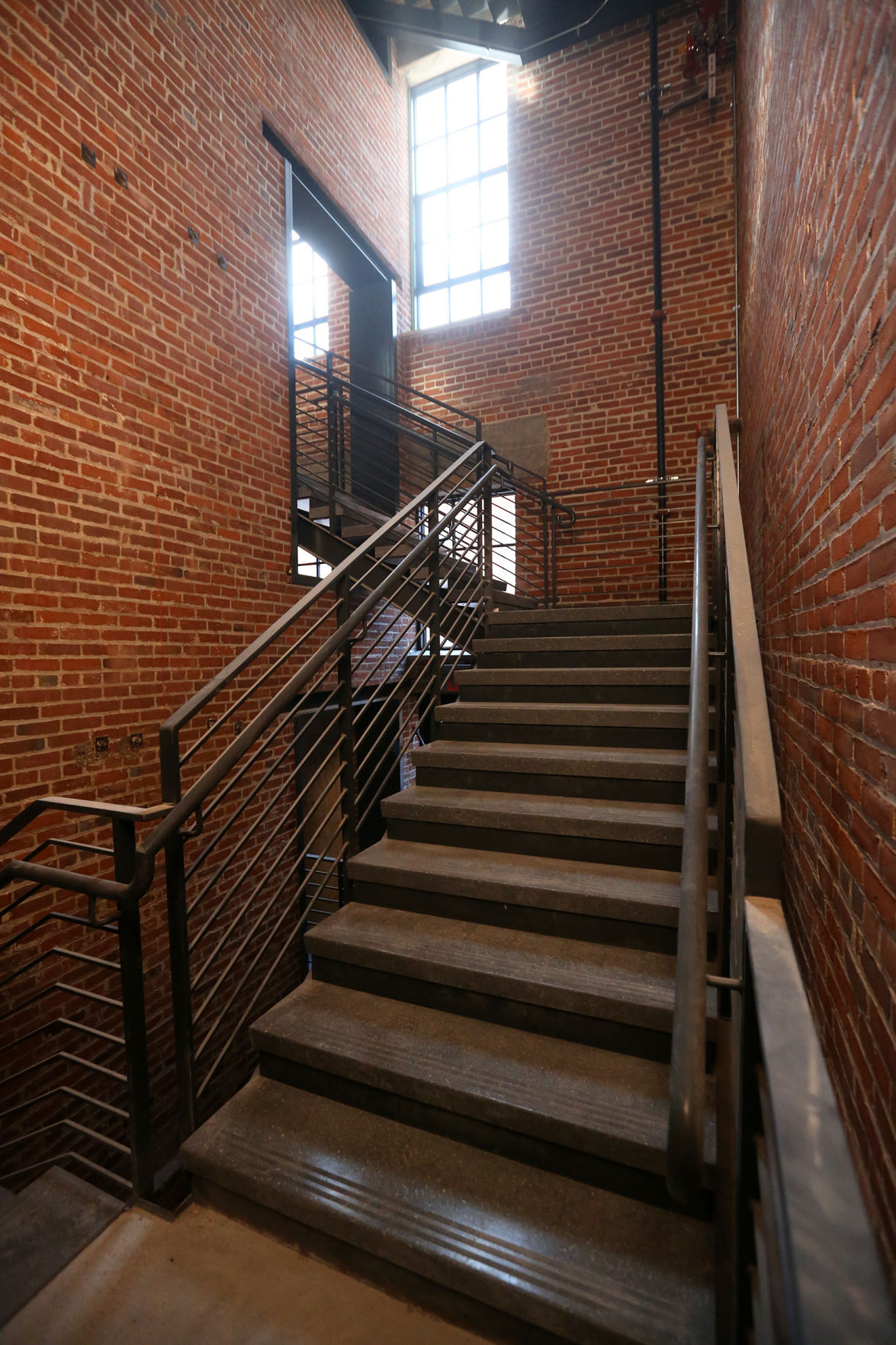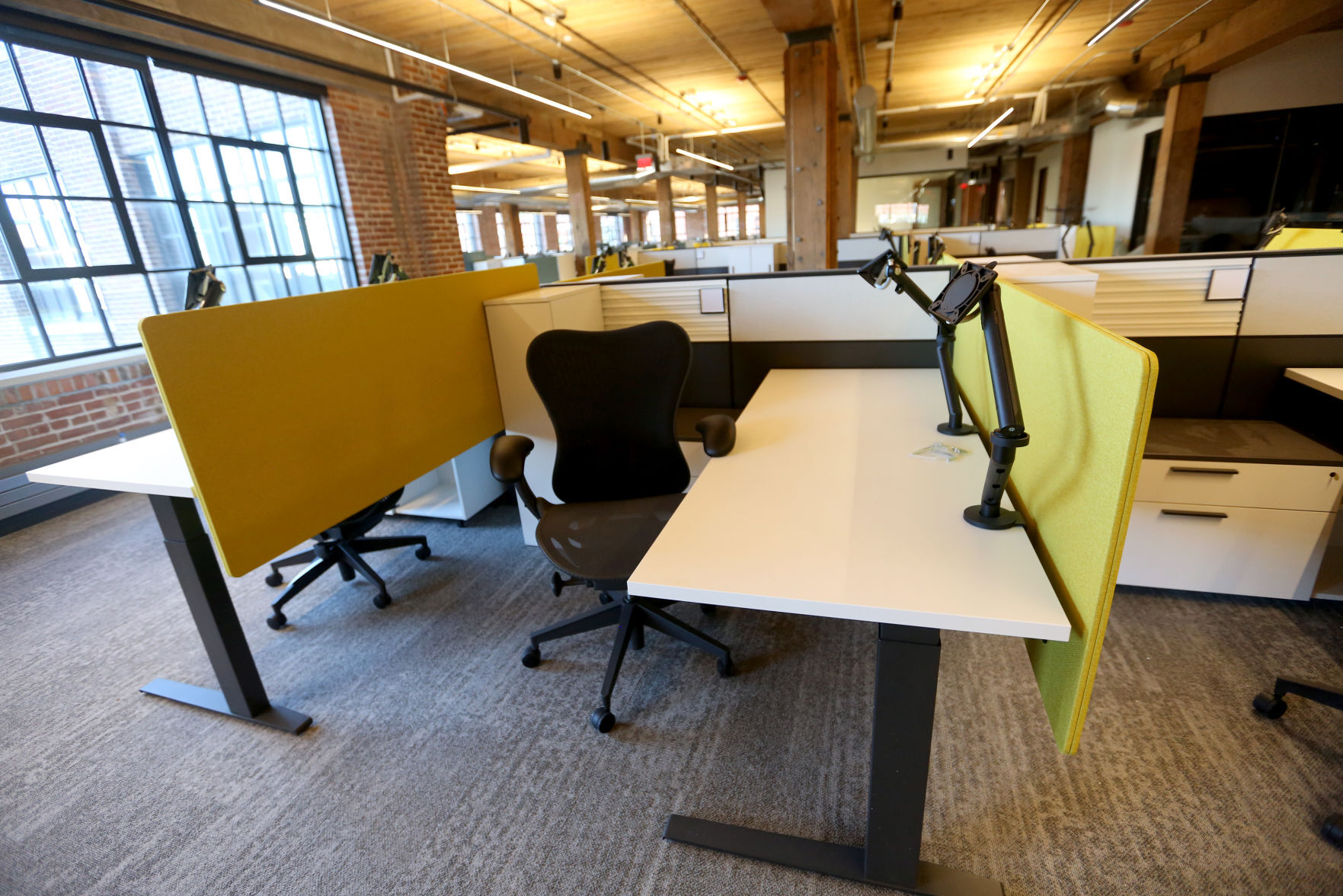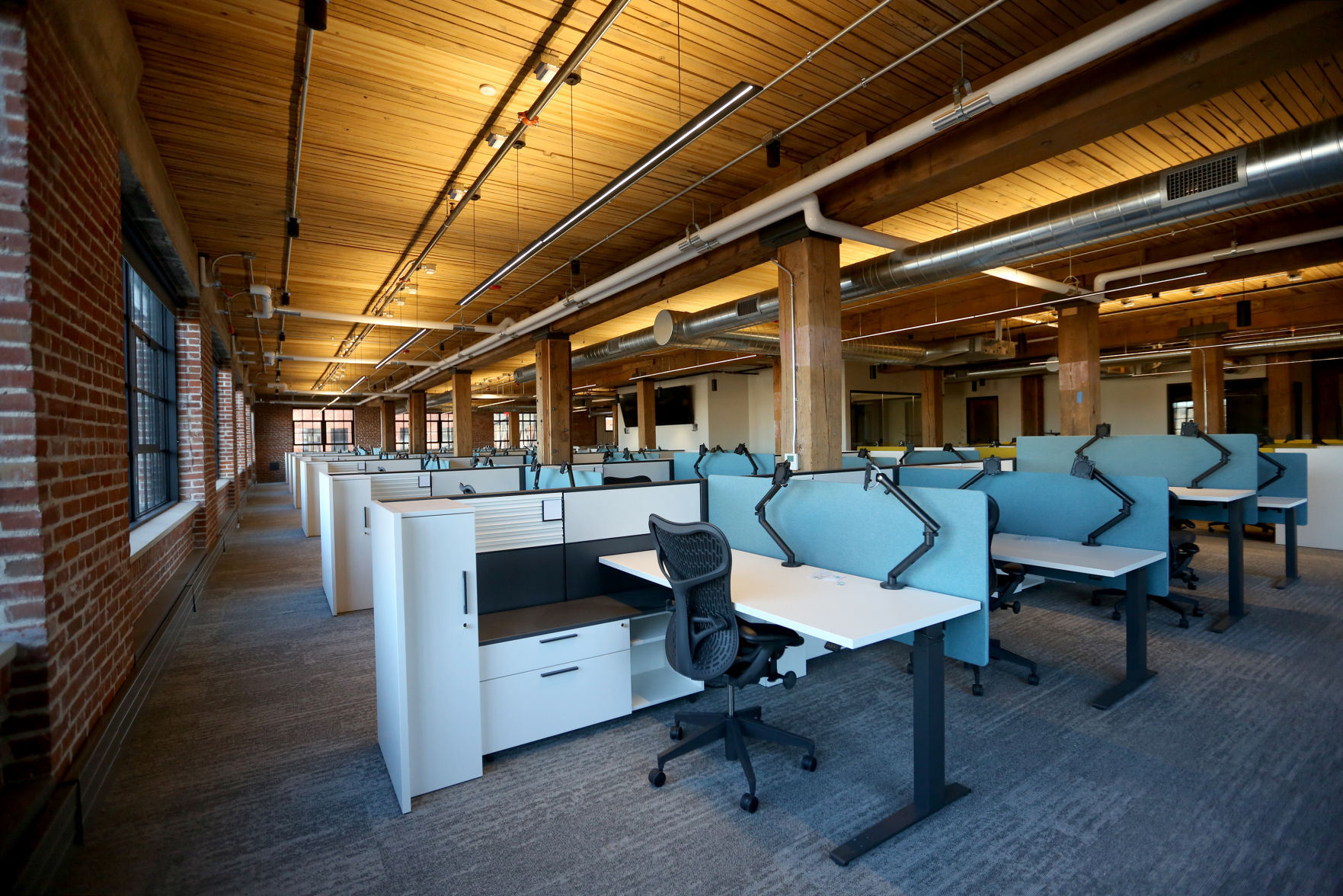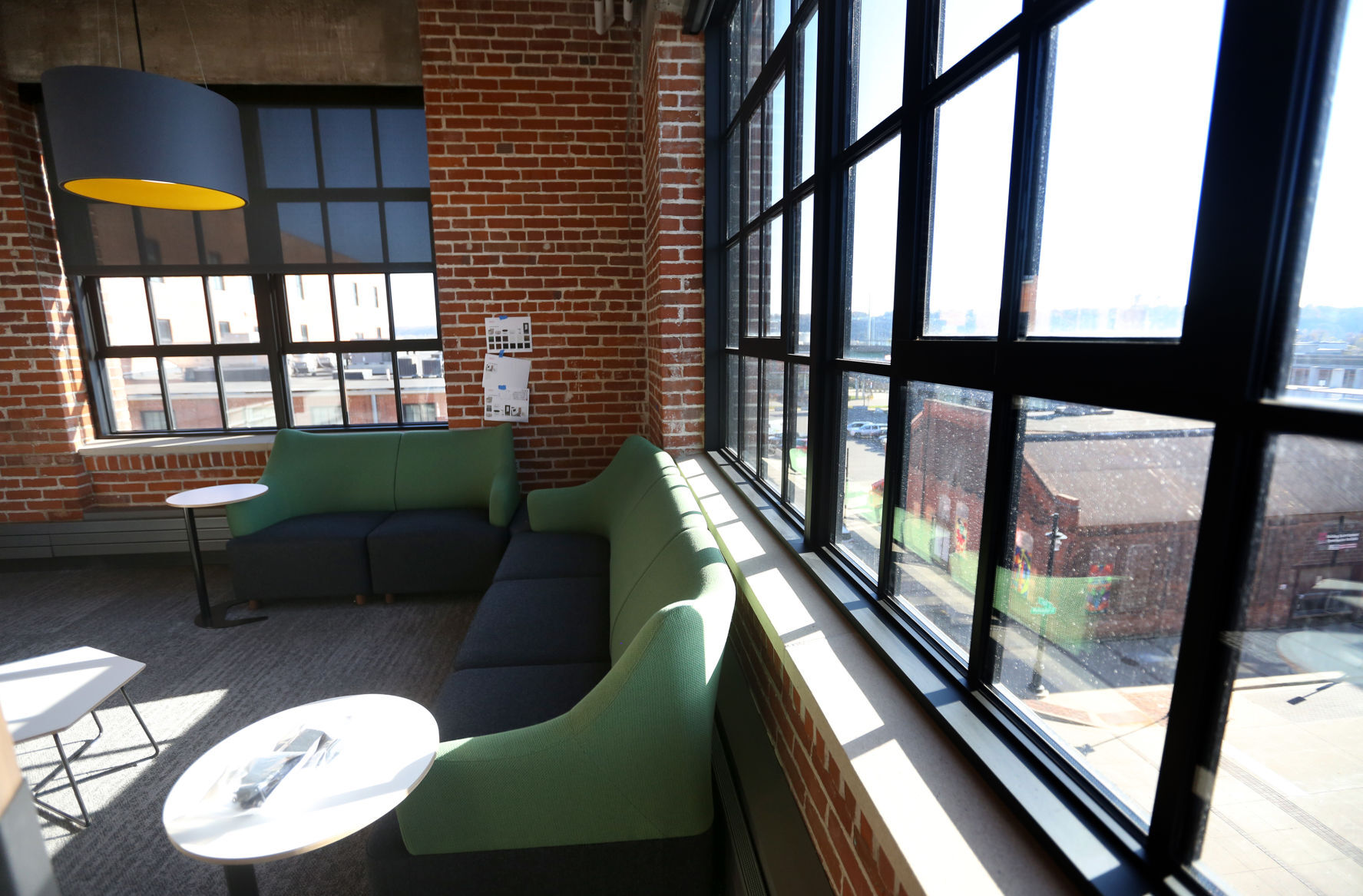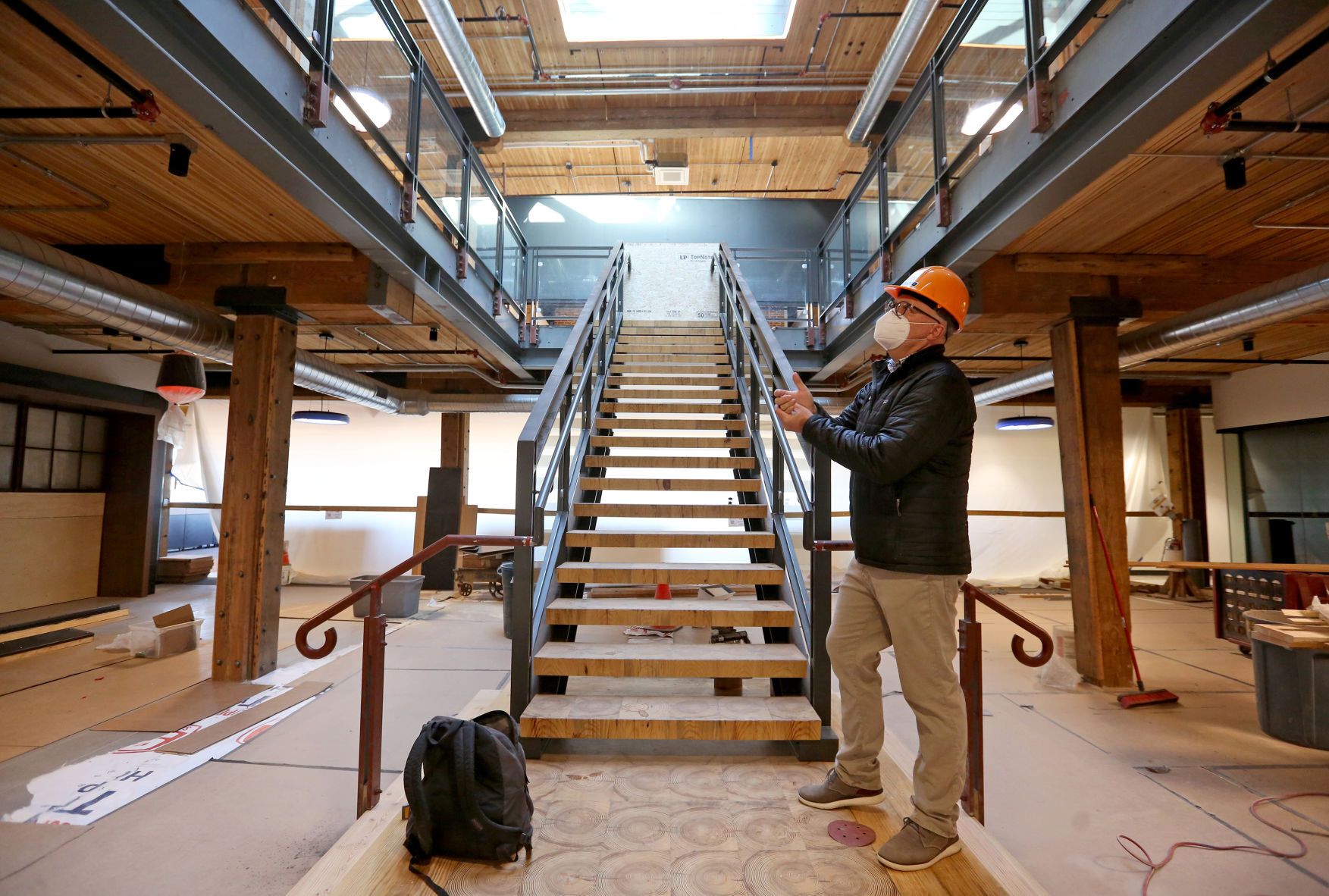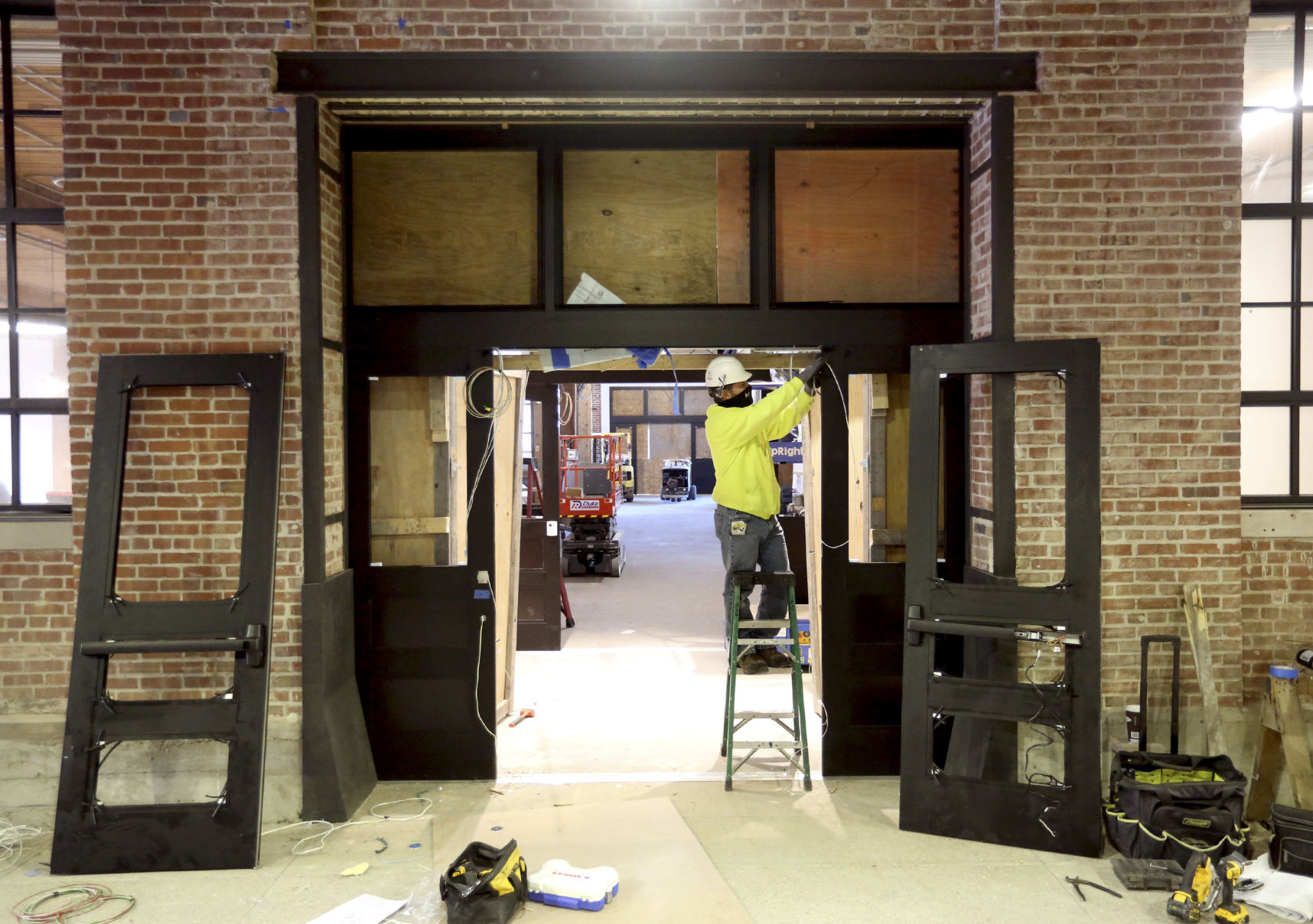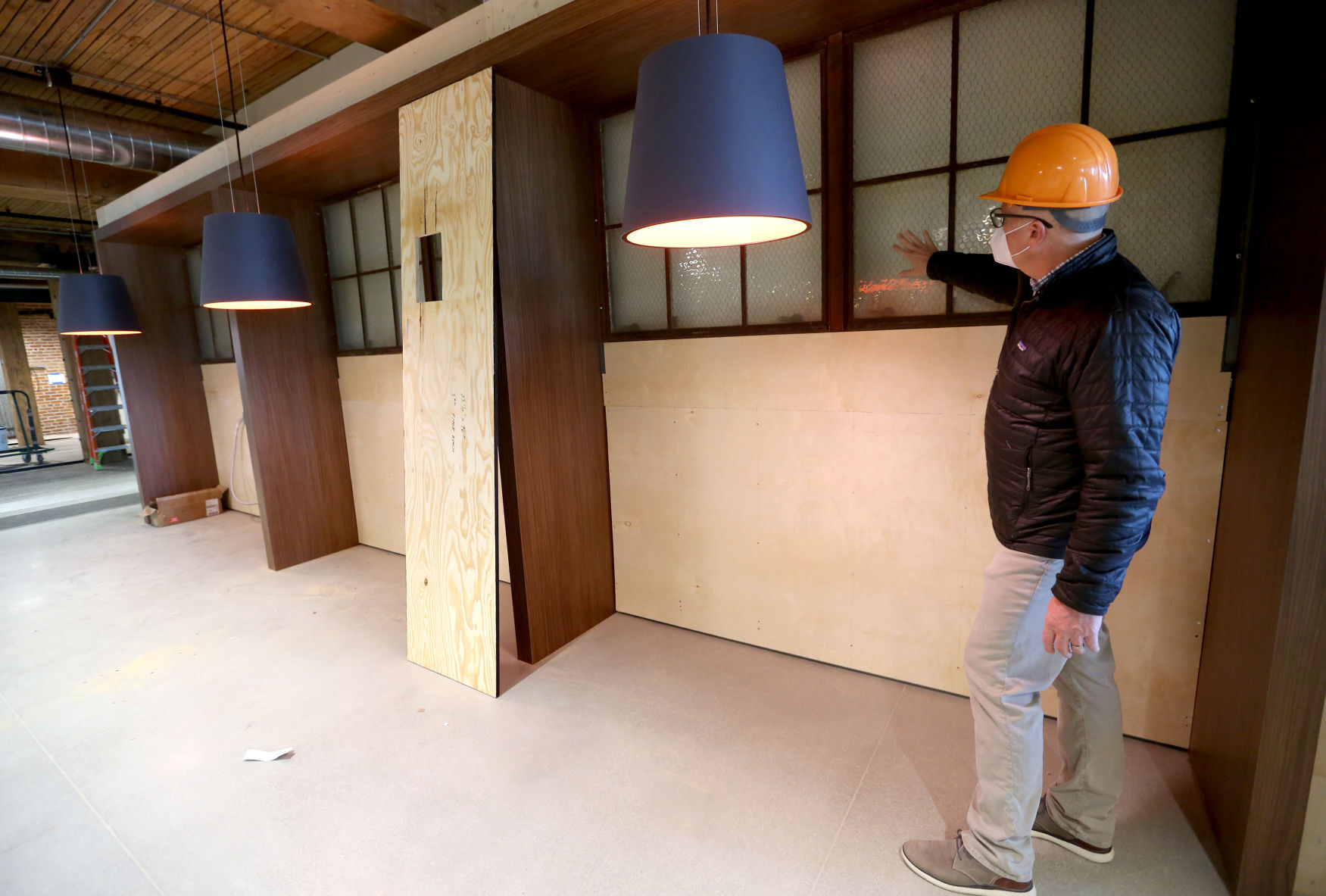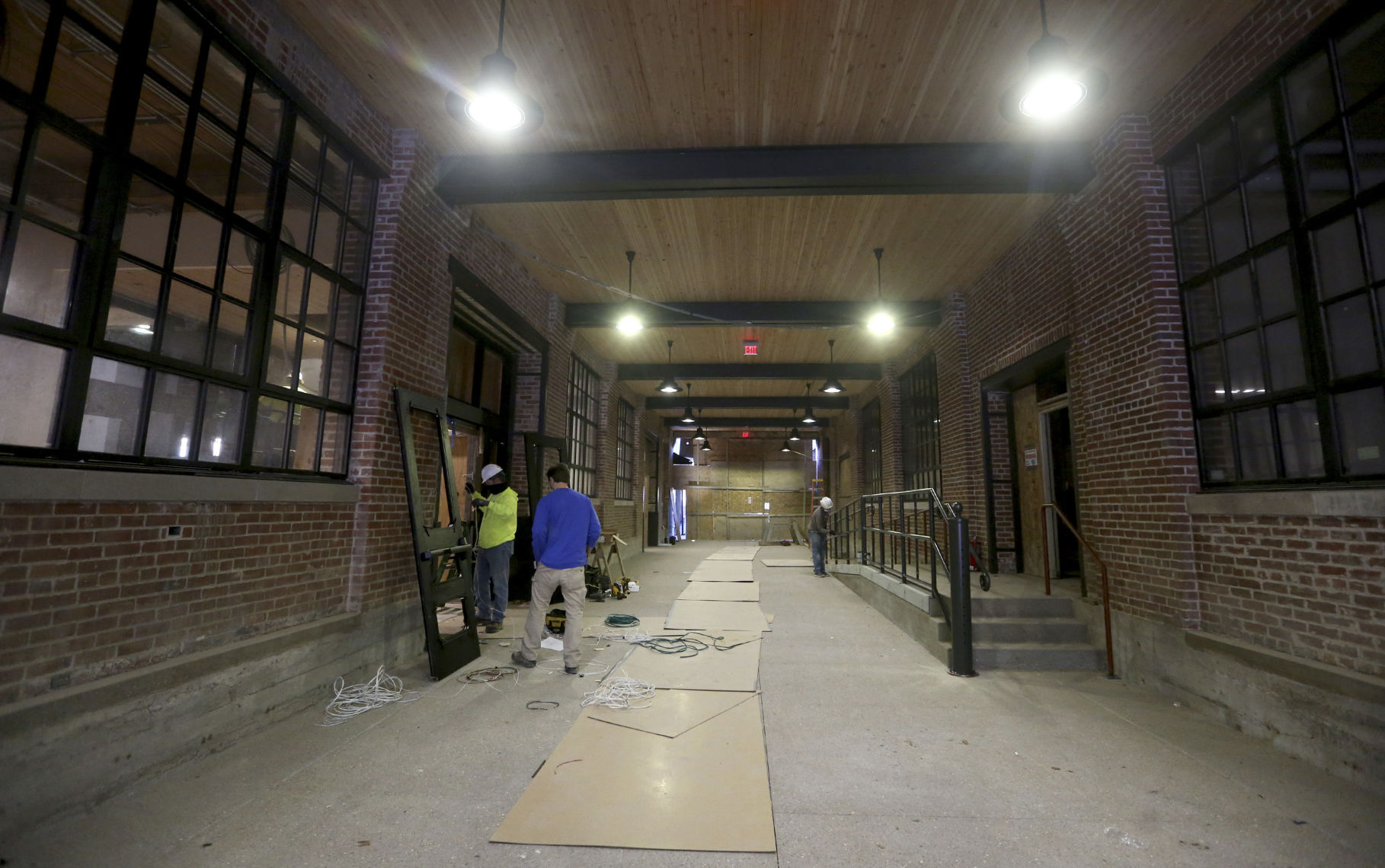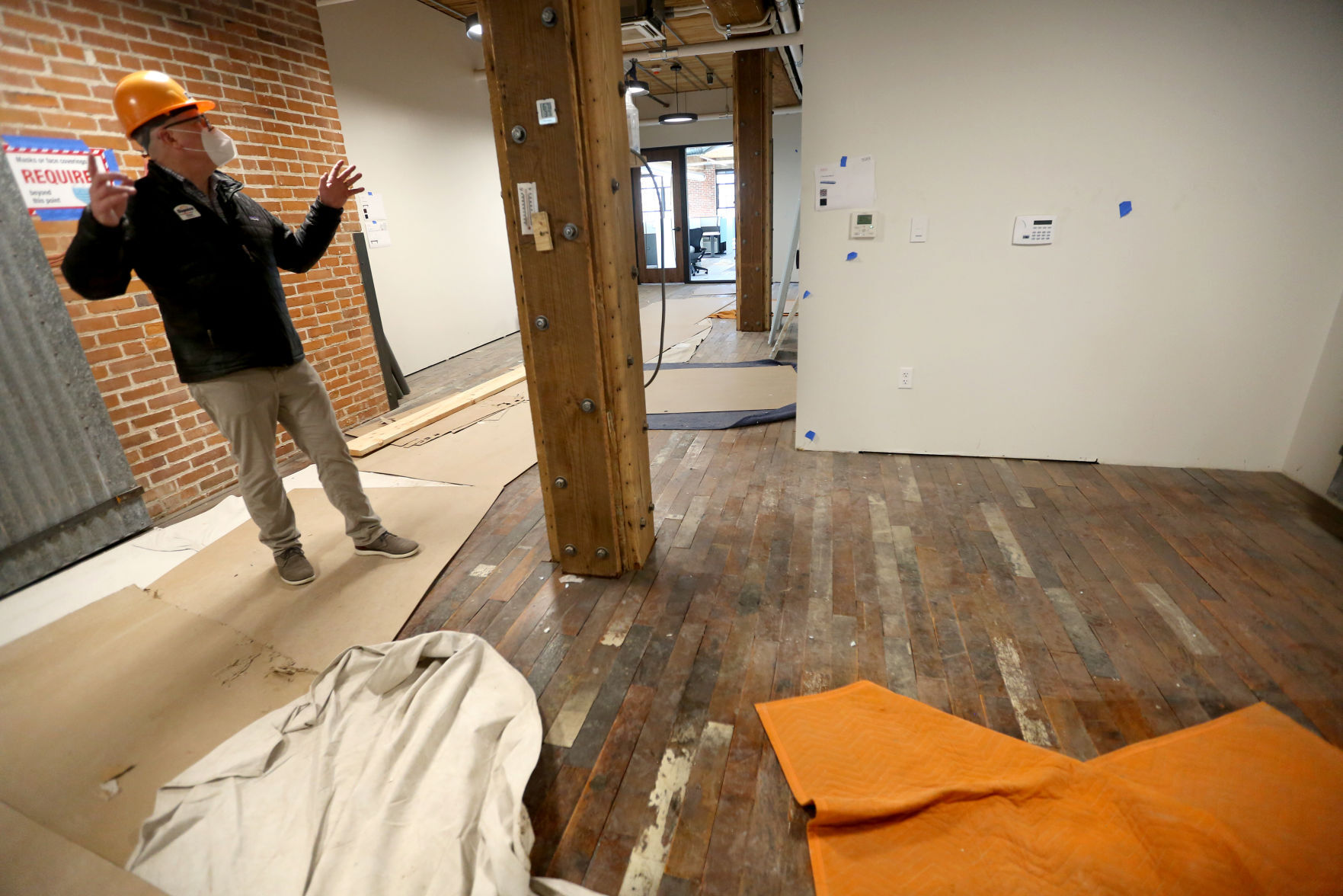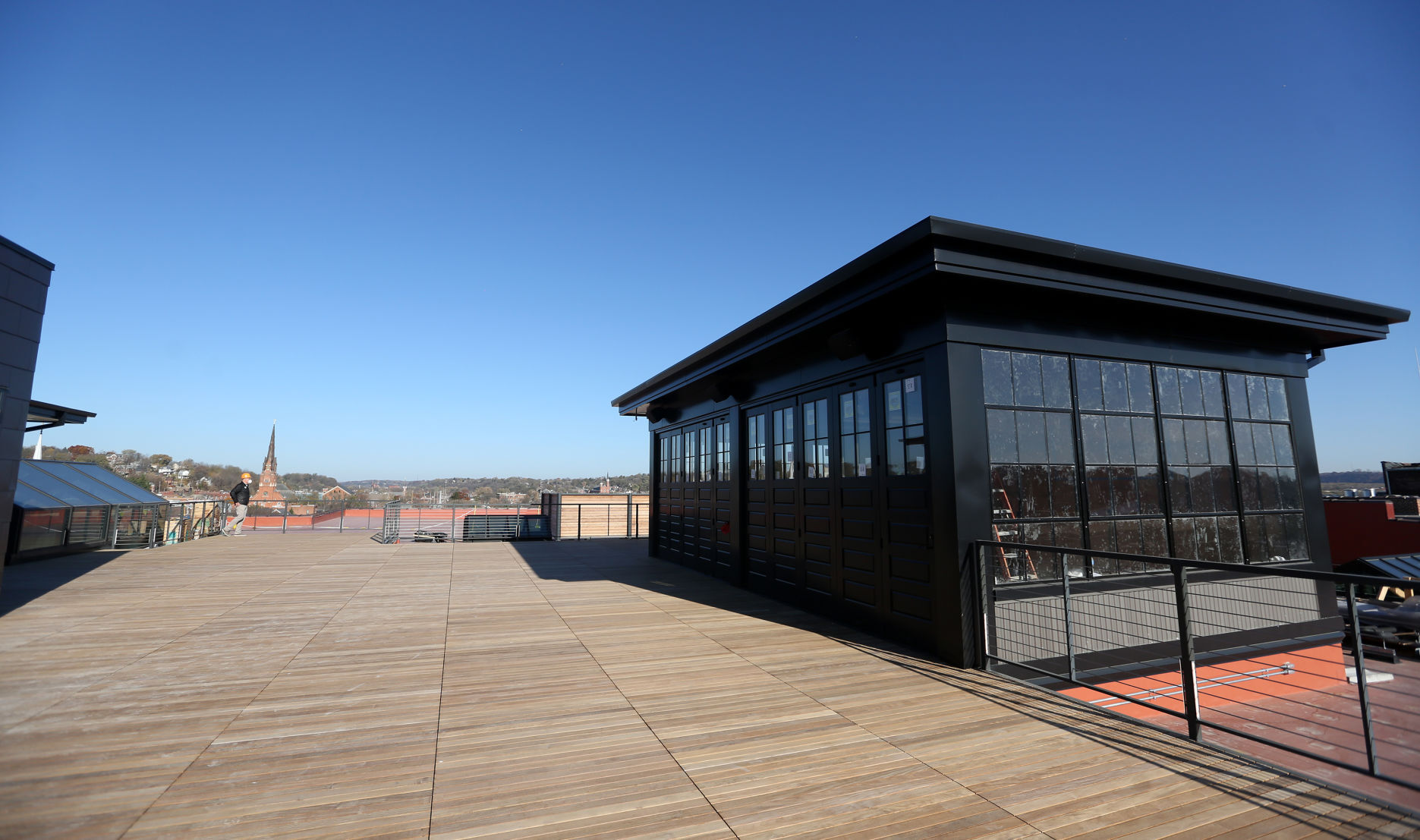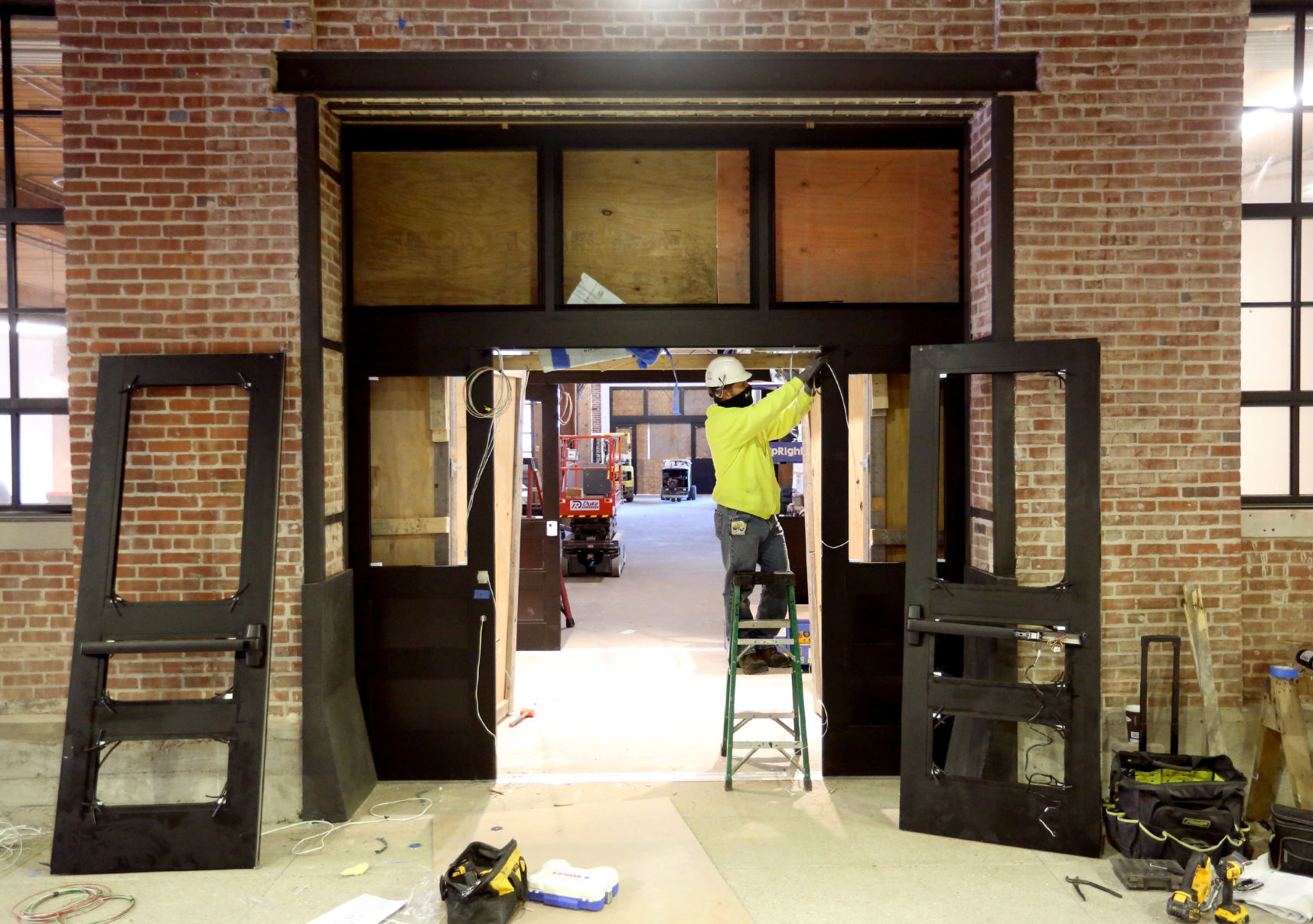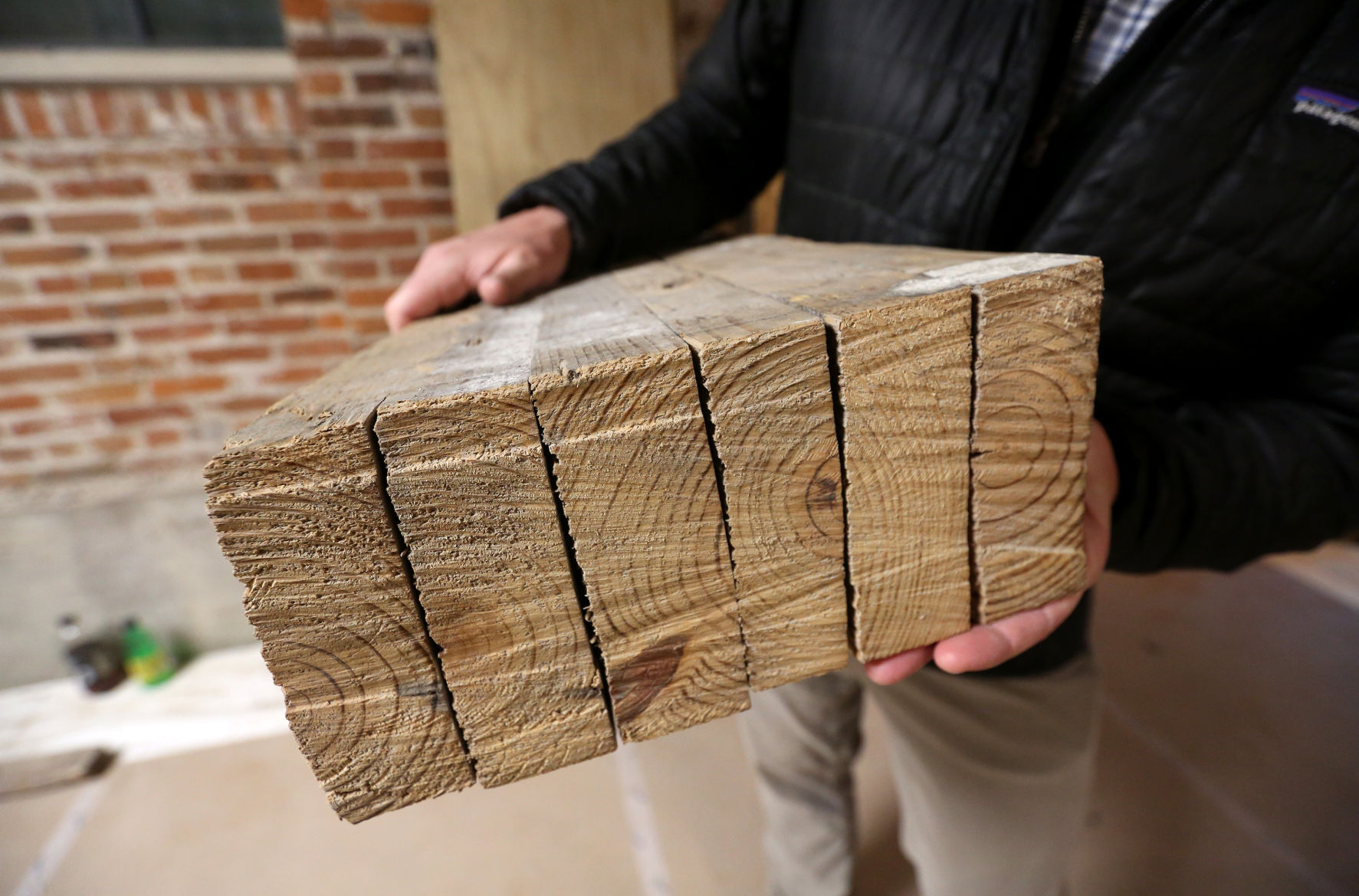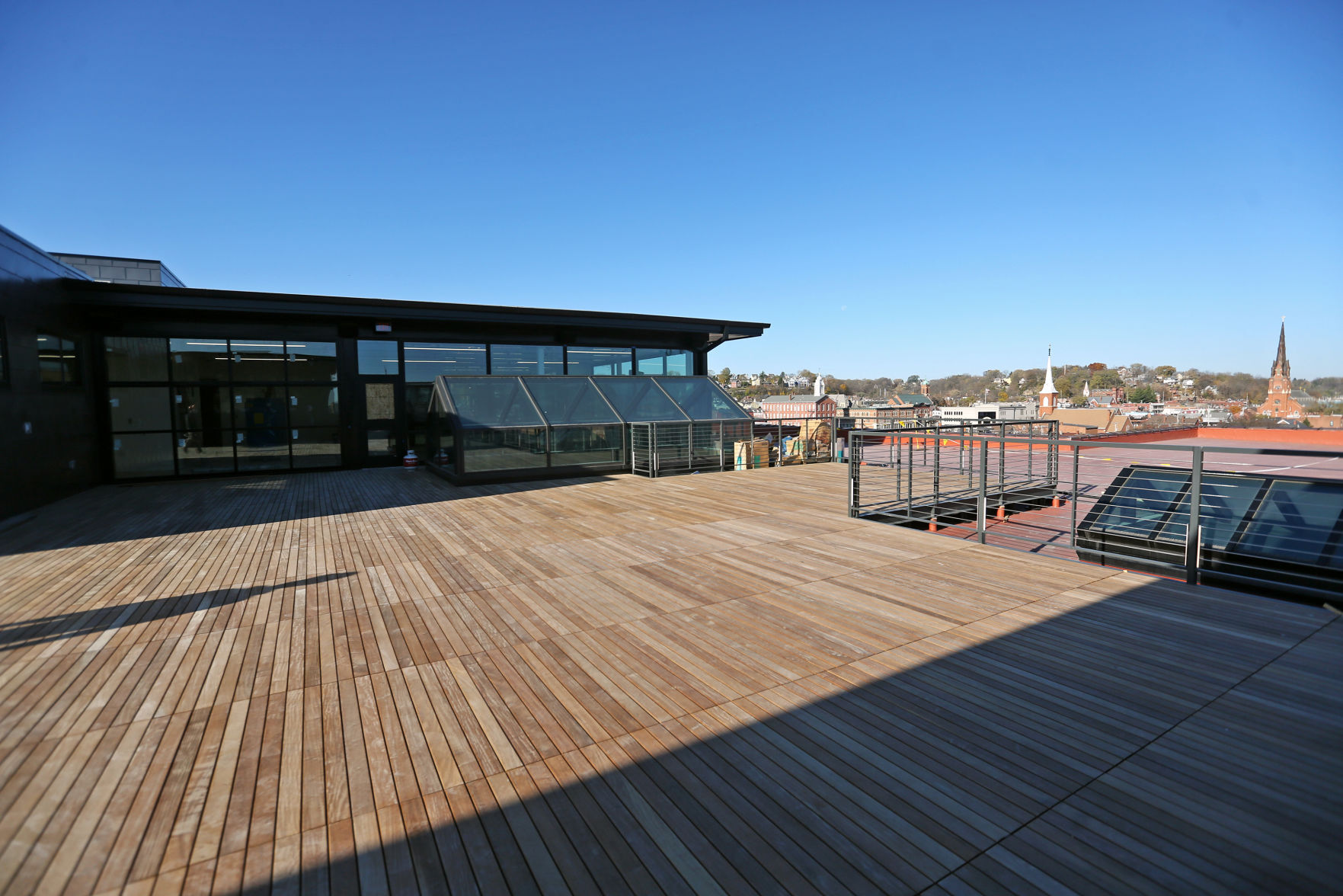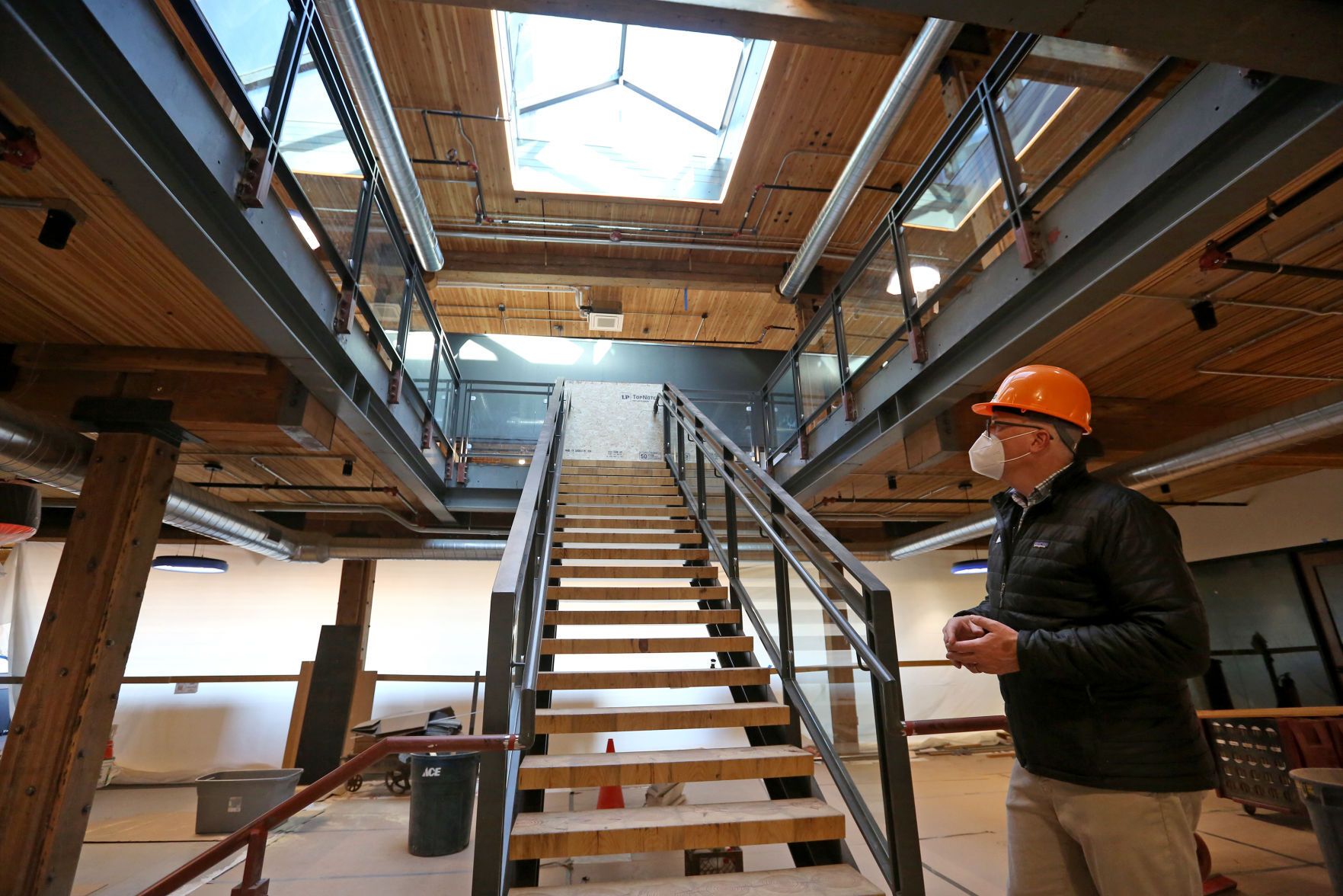Nearly two years have passed since Dupaco Community Credit Union announced plans to redevelop the Voices building, a historic, 175,000-square-foot structure on the corner of East 10th and Jackson streets in Dubuque.
As portions of the project near completion, the building’s future is coming into focus. Work stations and conference rooms already occupy the upper levels where Dupaco’s operations center will reside soon.
But the history of the building also shines through.
Contractors meticulously washed away layers of white paint to reveal the original brick walls and wood ceilings hidden underneath. In a newly created stairwell, the cables and pulleys from an old elevator shaft provide a nod to the past.
Dupaco’s $37 million investment has resulted in a facility that is both historic and modern, underscoring the essence of the neighborhood in which it resides.
Chief Marketing Officer David Klavitter is eager for the credit union to become part of the Millwork District and play a role in propelling it forward.
“The Millwork District is a differentiator, something that contributes to Dubuque’s unique sense of place,” he said. “We will be another component of that, a piece of the puzzle that clicks right in there to help create an amazing experience.”
Dupaco will welcome its first employees to the Voices building next month. It soon plans to house 170 workers in the building, although the COVID-19 pandemic could disrupt the timetable.
The impending opening is far from the only bit of good news in the neighborhood, which has continued to show signs of momentum even in a year marked by a pandemic and economic turmoil.
A Minnesota-based development group in October announced plans to create a 103-room boutique hotel in the Novelty Iron Works building, 333 E. 10th St.
And three months ago, city leaders approved a development agreement that will bring 48 apartments to a property at the corner of East Ninth and Washington streets.
Collaboration has been key to many Millwork District developments.
Dupaco has leaned on the expertise of consultants and contractors that are well-versed in the restoration of historic buildings. The city has provided financial support for the project and advised Dupaco on transportation options for the credit union’s employees.
“The list of partners goes on and on,” said President and CEO Joe Hearn. “That is what’s been so energizing. It has been great bringing people together and creating another positive development in this up-and-coming area.”
OVERCOMING ODDS
When Dubuque-based developer John Gronen reflects on the origins of the Millwork District’s revolution, his thoughts frequently turn to a meeting that occurred more than one decade ago.
Gronen recalls that representatives from the public, private and nonprofit sectors gathered for an impromptu gathering at Four Mounds in the mid-2000s to discuss the historic neighborhood, its present state and its vast potential.
“It was very organic — kind of a grass-roots thing that came together,” he said. “Much of what’s happened today was scratched out that night at Four Mounds.”
At the time of that meeting, the notion of revitalizing the Millwork District often was dismissed as far-fetched.
The Millwork District is located east of White Street and south of 12th Street, extending toward U.S. 61/151.
The area was the economic hub of Dubuque in the late 1800s and early 1900s, but the massive buildings that once housed scores of workers were largely abandoned as Dubuque embarked on the 21st century.
“There were many people who thought this project is too big for Dubuque,” Gronen said.
But the Four Mounds meeting marked a turning point, establishing a base of support and a collaborative mindset that ultimately would transform an ambitious vision for the district into an actionable plan.
Shortly thereafter, the development of the district was pegged as a Top 10 priority for the City of Dubuque.
From the very outset, stakeholders realized that the redevelopment of the neighborhood was not something that would happen overnight.
“This is a marathon, not a sprint,” Gronen said. “We knew from the beginning that, for this to come together, it was going to be a 15-to-20-year project.”
More than a decade into the process, Gronen said, the Millwork District is about where he expected it to be.
The Millwork District boasts retail stores, bars, restaurants and hundreds of apartments.
Some of the sprawling structures contain many of these offerings under one roof, including a building at 900 Jackson St. that was restored by Gronen’s company.
The Schmid Innovation Center offers apartments, commercial spaces and large areas that are specifically geared toward nonprofit organizations. Tenants such as Brazen Open Kitchen + Bar and Inspire Cafe have helped draw local residents and tourists alike.
Municipal and economic leaders, however, emphasize that the district is evolving still.
Dubuque Economic Development Director Jill Connors said the city recently allocated $50,000 to “refresh” the Millwork District plan. Although the process has been delayed by the pandemic, she believes it will help chart a path forward for the district.
“We cannot just rest on our laurels,” she said. “Instead, we have to strive for continuous improvement. We need to look at what needs to be changed, what needs to be added and subtracted, and we need to keep that momentum going.”
A variety of future developments are in the pipeline.
City Council members voted in August to support the creation of 48 apartment units in a property on the corner of East Ninth and Jackson streets. A development agreement places the cost at about $10 million.
Connors believes the property will fill a need in the district, where the supply of rental units struggles to keep pace with demand.
“The buildings with apartments have waiting lists,” Connors said. “This will create that additional residential space that people are clamoring for.”
A property known as the Alamo building also could be poised for changes in the near future.
The 5,400-square-foot structure at 990 Washington St. was built between 1872 and 1884 and is believed to be the oldest building in the Millwork District.
Gronen previously has expressed a desire to bring a restaurant and bar to the space. Officials continue to make improvements in hopes of luring the right tenant.
Gronen’s business also purchased a quartet of buildings formerly utilized by Jeld-Wen, which produced specialized wood fiber products used in interior doors. Two of the four buildings are located on East Eighth Street, while the others are located on East Ninth and Washington streets.
The eventual development of these buildings could one day be a game-changer, but Gronen emphasized that such progress cannot be rushed.
He hopes the Jeld-Wen structures will follow a path similar to the Voices building, noting that the owners held onto the facility for decades before finding the ideal occupant.
“Our intention was to buy the buildings, hold them and plan things in a way that not only serves the Millwork District but serves the community,” he said.
MOVING FORWARD
When something positive occurs within the Millwork District, it tends to have a ripple effect on others.
The Voices building is located across the street from the Novelty Iron Works building. That building’s co-owner, Bob Johnson, said the impending opening of Dupaco’s operations center will be a difference-maker for the entire district.
“For the neighborhood to be healthy, it has to have a good mix,” he said. “If there was anything that might have been missing before, it was a large office space component that could go along with the residential, the retail and the restaurants. Dupaco has totally fixed that.”
Within its vast confines, the Novelty Iron Works building houses dozens of apartments, as well as multiple business tenants. Backpocket Taproom, The Comedy Bar and Vivie Boutique are among the current group of tenants that attract large crowds to the building.
Johnson acknowledged that creating the right balance hasn’t always been easy. Restaurant Southern Ego closed months after opening and Foundry Restaurant and Bar lasted for only a year, demonstrating that not every idea sticks.
“For our building, restaurants and retail has been an uphill climb,” Johnson said. “It always is in any newly established area.”
It is clear, however, that the property has recently hit its stride.
In late October, the building celebrated the opening of a revamped bar buoyed by a local celebrity.
Gary Dolphin’s Iron Bar, which borrows its name from the well-known Dubuque County resident and Iowa Hawkeyes radio broadcaster, opened just in time for the kickoff of the Iowa football season. It features special themed sections like “The Press Box” and boasts a massive jumbotron in the adjoining courtyard.
Just days after the bar’s opening, a Minnesota-based development company unveiled plans to invest $30 million in the Novelty Iron Works building.
An unused section of the building will be developed into a 103-room boutique hotel. Construction is slated to kick off in the first quarter of next year and should be completed by the end of 2021.
Johnson believes the project will fill a need in the district, which has evolved into a major destination for weddings and other large events. The TownePlace Suites by Marriott opened two years ago, but Johnson believes the neighborhood still doesn’t have the volume of hotel rooms needed to meet demand on busy weekends.
“By all observations, (the Marriott) has been a big hit,” Johnson said. “With the new hotel, I think we are going to make the district a more viable option for even larger gatherings.”
CREATING A DESTINATION
About five months ago, Dubuque-based retailer The Midwest Girl moved its storefront into a recently redeveloped building at 898 Jackson St.
It was a relatively short move for the business, which previously operated a location near the foot of Fenelon Place Elevator.
Even in a year marked by health concerns and economic woes, co-owner Marissa Hoffmann has noticed a perpetual buzz in the Millwork District.
On a daily basis, teens and young adults gravitate to the district to take photos against the backdrop of the neighborhood’s historical industrial buildings. Hoffmann isn’t surprised that the area has become such an attraction.
“It has that urban feel,” she said. “When people are here, they feel like they are in a cool neighborhood in Kansas City or Chicago.”
Compared to newcomers like Hoffmann, Keith Gutierrez is a veteran of the Millwork District scene.
Gutierrez opened 7 Hills Brewing Co. at 1085 Washington St. in 2017. In the past three years, he has seen the district develop around him.
The extended-stay hotel opened across the street. New restaurants, retail shops and an upscale event center have also staked their claim to spaces in the Millwork District.
Gutierrez believes the district is developing a positive reputation that resonates with many outside of Dubuque. As a result, tourists have sought out the neighborhood in high volumes.
“I think the Millwork District is more of a tourist destination than Main Street,” he said. “This area has become more of a Google attraction than a local attraction.”
Gutierrez admits that COVID-19 has taken some wind out of the district’s sails in 2020.
But he needn’t look far for optimism. His brewery shares an alley — and a soon-to-open corridor — with the Voices building. The influx of employees is bound to bring in more lunch and after-work customers.
Gutierrez emphasized that the brewery is even bringing back a rotational beer that was originally named in honor of Dupaco. Brewpaco will be on tap by the time the operations center opens.
To Gutierrez, the credit union’s arrival will serve as a reminder that, even in a difficult year, the trajectory of the Millwork District still is pointed upward.
“My outlook is positive,” he said. “I think things will rebound. When people come back out, they are going to come back in a big way. Everyone’s calendars are going to be packed.”
SENSE OF CONNECTION
As the opening date for Dupaco’s operations center nears, company leaders have started showing off the facility to those who will occupy it.
“We have been giving our employees tours along the way,” said Hearn. “I cannot tell you how excited they are to be able to bring their talents down to a historic and state of the art facility like this.”
Klavitter said the opening of the building will mark a return to the credit union’s roots.
Dupaco was founded in the 1940s by a small group of meatpackers employed by Dubuque Packing Co., which was located just six blocks from the building the credit union will occupy.
“The mill workers and the pack workers lived in these neighborhoods,” Klavitter recalled.
Dupaco employees will occupy the top three levels of the five-story building. Officials originally planned to bring 170 people in the facility when it was ready, but Klavitter acknowledged that COVID-19 could alter those plans.
Staff members relocating to the new building will include those who specialize in marketing, human resources, accounting and card services.
The new property was designed to enhance the worker experience in a variety of ways: A vast array of windows and a new skylight allow for the flow of natural light; meanwhile, indoor amenities such as bike parking spaces and shower facilities appeal to those who would prefer to walk or cycle to work.
Klavitter emphasized that Dupaco will not be the building’s only occupant.
The second floor in the building will likely be leased to an office tenant. The first floor, meanwhile, could feature retail or restaurant options available to the public.
While nothing is set in stone, Klavitter said there has been plenty of tenant interest.
“We are looking for a tenant mix that will add vibrancy, not only to the building but also to the district and the entire downtown,” he said.
As the arrival of Dupaco’s first workers draws nearer, Hearn is excited to see the years-long project reach the finish line.
“When you look at what this building has to offer, we think it will give employees a remarkable working experience,” he said. “We know all this work has been worthwhile.”


